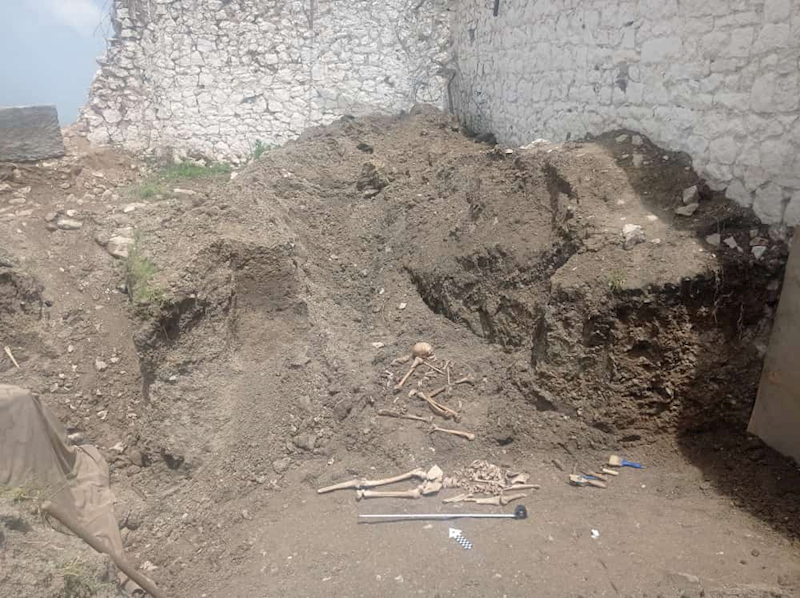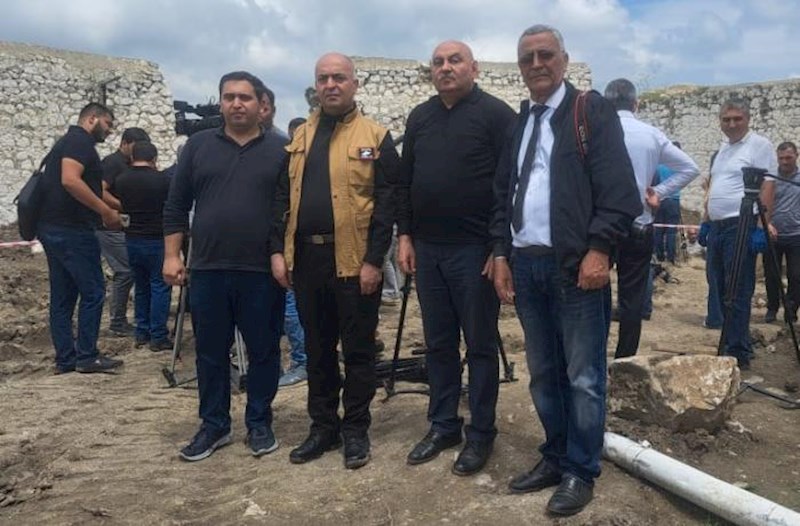This short report is prepared as a result of the visit of the group of NGOs to the mass grave site in June 3, 2023, located in Shusha, near the old Shusha prison, in Karabakh area of Azerbaijan.
In accordance to the report of the Every Casualty Counts, in March 2023 on the “Casualty recording in international human rights and humanitarian law”, in its final report on breaches of international humanitarian law during the 1990s conflict in the former Yugoslavia, the United Nations Commission of Experts noted that: A mass gravesite is a potential repository of evidence of mass killings of civilians and POW’s …The manner and method by which a mass grave is created may itself be a breach of the Geneva Conventions, as well as a violation of the customary regulations of armed conflict…Parties to a conflict must also ensure that deceased persons are …buried in individual graves, as far as circumstances permit.[1]

A mass grave was found during excavations near Shusha prison, deputy head of the working group of the State Commission for Prisoners of War and Missing Persons and Hostages Eldar Samedov told journalists.
In particular, fragments of 3-4 human skeletons were found and the excavations will be continued.
The State Commission has several graves of Azerbaijani citizens captured by Armenians during the first Karabakh war in Shusha.
“The citizens of Azerbaijan, who were captured and taken hostage during the occupation of the city (May 1992), were kept here in inhuman conditions. Numerous crimes were committed against them, international humanitarian law was violated.
According to our data, 360 Azerbaijani captives and hostages were kept here (in Shusha prison) during the occupation. As a result of negotiations conducted by the State Commission, 216 of them were released. But the fate of the rest is still unknown. We believe that the remains found belong to the people we are searching for,” Samedov said.
Independent expert opinion
After the second Karabakh war mass graves of Azerbaijanis were found near Dashalty village of Shusha region, Kelbajar, on Mount Farrukh in Khojaly region, Edilli village of Khojavand region.
It seems that the mass grave found in Azerbaijan’s Shusha is not the only one of its kind, research will be carried out in other places. There are similar graves in other places, military-political expert Telman Gasimov told journalists.
The expert reminded that a significant number of Azerbaijanis went missing in the first Karabakh war, and nothing is known about their fate.
“According to the latest data, up to 360 Azerbaijani captives were kept in the Shusha prison and other basements. More than 100 of them were released. Based on the testimonies of the released, it turned out that our prisoners were subjected to terrible torture. Naturally, these tortures ultimately led to death,” Gasimov stressed.
Statement by the Ombudperson
Human Rights Commissioner of Azerbaijan, Ombudsperson Ms. Sabina Aliyeva stated with regret that these are not the only facts testifying to the crimes committed by Armenia in violation of the requirements of international humanitarian law. Thus, earlier appeals were sent to the world community and a separate report was prepared on the results of studies at the site of mass graves found in the village of Edilli, Khojavend district.
The regular detection of mass graves in the liberated territories once again proves the policy of genocide and ethnic cleansing pursued by Armenia against Azerbaijanis.
“I once again call on the world community to take the necessary measures against Armenia in connection with such cases and to provide support in obtaining information about the fate of our missing compatriots.” –concluded Ombudsperson.
Data on missing persons
According to data compiled by the Azerbaijani government, 3,890 Azerbaijani citizens, including 71 children, 267 women, and 326 older adults, went missing during the First Karabakh War from 1991 to 1994. Baku has been demanding that Armenia assist in investigating the fate of those people, a request that remains unfulfilled. Post-war searches in the liberated territories unearthed the remains of 12 civilians in the Kalbajar district, where the Armenian armed forces committed the Bashlibel mass murder in 1993. In addition, earlier this year, mass graves of the Azerbaijanis were found in the Dashalti village near Shusha city and the Edilli village of the Khojavand district.
According to data released by the State Commission on Prisoners of War, Hostages, and Missing Persons, 46 Azerbaijani servicemen went missing in the Pirlar village of the Khojaly district in the 1990s. At the same time, 11 Azerbaijani servicemen went missing in the Aliaghali village of the Aghdam district. The commission is convinced that these areas could be home to the remains of Azerbaijani servicemen who went missing during the First Karabakh War.
Experts in Baku believe that the mass graves of Azerbaijanis killed by Armenians could be found in more locations in the Karabakh region, including in the Khojavand, Khankendi, Khojaly, Fuzuli, Shusha, and Aghdam districts.

Legal assessment
NGOs and experts participated in the fact-finding mission and conducted a legal assessment of the situation. From the human rights point of view, without respect for the right to life, no other human right can be upheld. Extrajudicial, or arbitrary executions – meaning the deliberate killing of individuals outside of any legal framework – are a violation of this most fundamental right.
According to the customary international humanitarian law, the murder of civilians and prisoners of war was included as a war crime in the Charter of the International Military Tribunal at Nuremberg. Common Article 3 of the Geneva Conventions prohibits “violence to life and person, in particular murder of all kinds” of civilians and persons hors de combat.
The dead must be disposed of in a respectful manner and their graves respected and properly maintained. The obligation to dispose of the dead respectfully was first codified in the 1929 Geneva Conventions. It is now dealt with in detail in the First Geneva Convention, Article 17; Second Geneva Convention, Article 20; Third Geneva Convention, Article 120; Fourth Geneva Convention, Article 130. The requirement to respect and maintain gravesites is also laid down in numerous military manuals.
The Geneva Conventions specify that the dead must be buried, if possible, according to the rites of the religion to which they belong. The Geneva Conventions furthermore require that, in principle, burial should be in individual graves. Collective graves may only be used when circumstances do not permit them. These requirements are also set forth in numerous military manuals.
We once again call on the international organizations to take the necessary measures in connection with such cases and to urge Armenia to provide with the map of the potential burial sites in the territory of the Karabakh region of Azerbaijan and support to us in obtaining information about the fate of our missing compatriots.
[1] https://everycasualty.org/wp-content/uploads/2023/03/FINAL-FINAL-Advocacy-Report_2023_DPS_48pp.pdf

